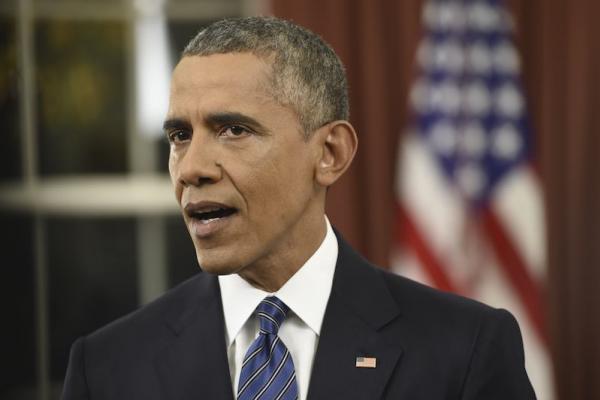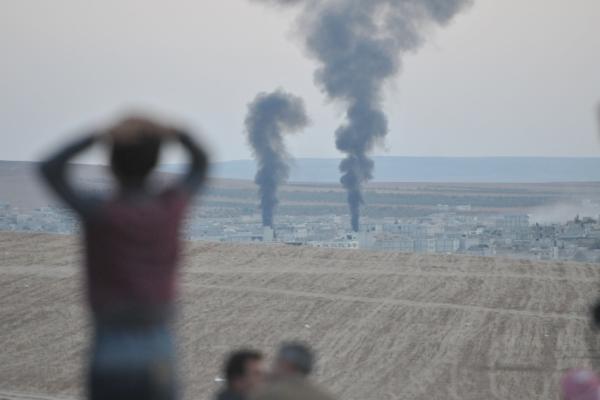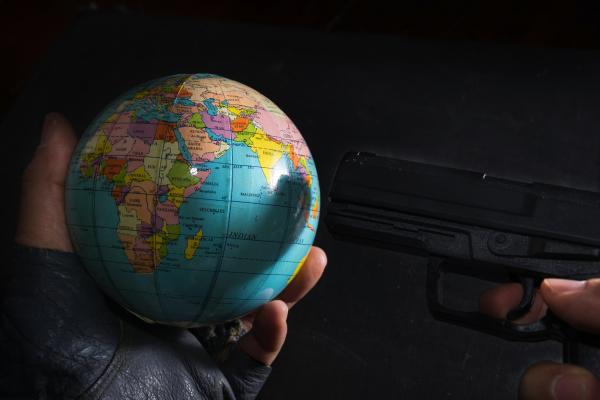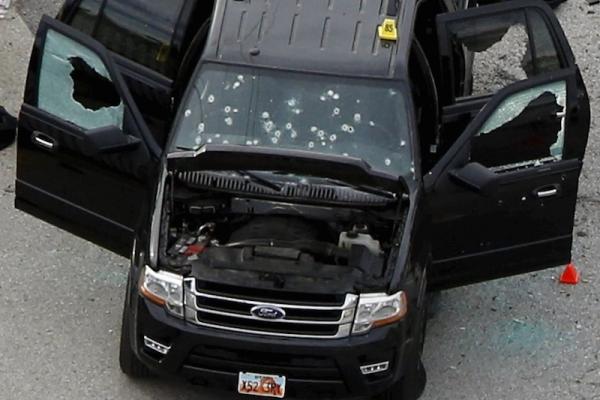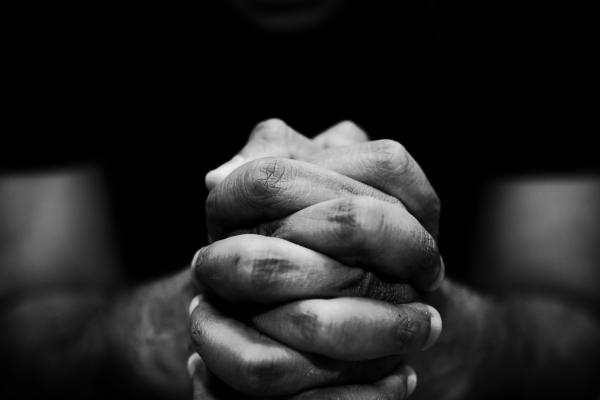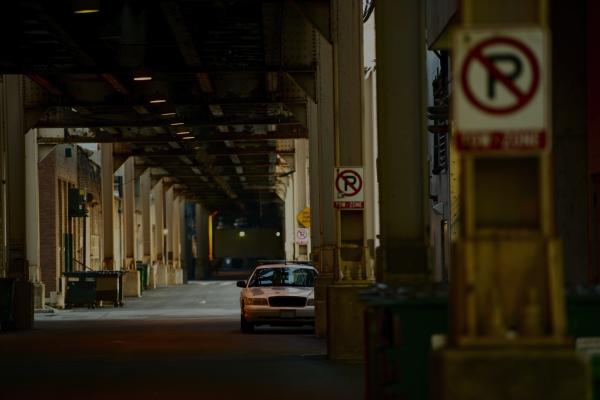President Obama sought to reassure the nation amid renewed fears of terrorism the night of Dec. 6, saying the terrorist threat has “evolved into a new phase” of attacks hatched at home by extremists “poisoning the minds” of killers already on American soil.
“I know how real the danger is,” said Obama.
“The threat from terrorism is real, but we will overcome it. We will destroy ISIL and any other organization that tries to harm us,” Obama said.
I wonder if Pope Francis knows that he’s being used to justify bombing Syria.
After an all-day debate on Dec. 2, the House of Commons authorized the British government to begin bombing ISIS in Syria. Hours later, RAF Tornadoes attacked an oil field in eastern Syria.
During the debate, Caroline Spelman, the member of parliament who represents the Church of England in the Commons, noted that, “The Archbishop of Canterbury made it clear that, in his view, force might be necessary to keep the refugees safe.”
Then, citing Pope Francis, she said, “‘Where aggression is unjust, aggression is licit against the aggressor.’ These are views which I share, which is why I will support the motion.”
“We can’t just blame it on the brokenness of the world, pray for peace, and move on, worried that anything more will be seen as politicizing tragedy. What is tragic is that those who have the ability to DO something about this crisis refuse to offer more than simplistic sentiments on Twitter before getting caught in a circular argument about our rights as Americans. It’s time for people of faith to respond.”
2. The 20-Year-Old Ban That Silenced Research on Gun Violence
Because: NRA. “Researchers from federal agencies including the Centers for Disease Control and Prevention (CDC) and the National Institute of Health (NIH) have largely been mum on the public health issue of gun violence — not by choice, but because of a 20-year-old congressional ban on federally funded gun violence research.”
3. Emanuel: Chicago City Officials to Release Ronald Johnson Shooting Video
Chicago Mayor Rahm Emanuel said Thursday that the city would release dashcam footage of a Chicago police officer shooting 25-year-old Ronald Johnson III in the back. The shooting happened eight days before officer Jason Van Dyke shot and killed 17-year-old Laquan McDonald.
4. People Think ‘The Wiz Live’ Is Racist. Twitter Says, ‘Huh?’
Actual tweet: "I just learned there is a Black version of 'The Wizard of Oz' called 'The Wiz.' How is this not racist?" Oy.
As in Biblical times, the Christmas season officially begins the day after Halloween, and that’s when the holiday catalogs started showing up.
Gird your loins folks: the Season of Audi has arrived.
The deep introspection, the "Emmanuel, God with us" soul-searching can wait until January, when all the hubbub has passed and the bills start arriving.
We piled the catalogs up on the dining room buffet as a visual warning against the coming materialistic storm. A few caught my eye:
“Soft Surroundings: My time. My place. My self. Winter collection. Clothing, home, beauty.” My, oh my, it really IS all about me. For the narcissist in all of us…
“HearthSong: Toys You’ll Feel Good About Giving. Over 100 New Toys… And Limitless Joy!” After 45 minutes of page-flipping, and several phone calls to their 1-800 line, it turns out that HearthSong does not sell Limitless Joy as a stand-alone product. It comes only with the purchase of a toy.
For the first week of Advent, my wife Amy preached about hope. She pointed out that having hope doesn’t mean necessarily that we see a way out of suffering. It does, however, give us a reason to try to keep working through it. We have to believe there’s another side to it. Another possibility. The potential for a new reality.
And that reality will never, ever be realized by responding to violence with more violence. It may make us feel better in the moment. It may seem to offer short-term relief. But ultimately, it makes everyone that participates become a little bit of what they hate. And the cycle continues.
Which story will we choose to try to live into?
Tashfeen Malik, the female suspect in the San Bernardino shooting spree, had expressed support for the Islamic State terrorist group and its leader, Abu Bakr al-Baghdadi, in a social media post, according to two U.S. officials.
While there was no indication yet that the extremist group, also known as ISIL or ISIS, directed the massacre in California that left 14 people dead, the posting represents the strongest link yet that the killings may have been rooted, at least partially, in terrorism.
Scene: A row house in Adams Morgan, Washington, D.C.
Me: Hi, Joanna! Bob tells me you're writing a book about mansplaining — that’s so interesting!
Joanna: Yeah, I'm excited! It got picked up by a publisher and they're thinking of doing a pretty serious marketing push.
Me: Awesome. I'm a pretty quiet dude by inclination, so I thought I was immune to mansplaining. Then I found myself holding court on Aristotelian metaphysics at a party last week and realized that I was terribly mistaken. I totally speak over and ignore women who know what they are talking about and spend ages explaining things to them anyway.
Joanna: Well, the concept is a bit more complicated than that—
Me: And, of course, society teaches women that you need to nod politely even when you really don't care.
Joanna: Well—
Me: And usually I'm too oblivious to even notice! I think it might even be worse, in a way, when I'm complicit in these conversations, when I don't try to make space for women who know what they're taking about. Most of the time — shamefully — I prefer to listen to a dude gas on about something. Why do I do this? Two big reasons that I can think of (I hold up two fingers):
First (index), I'm a sexist pig. …I can't really play that down. I don't pay attention to women like I should, because I simply don't care enough. I've got some serious respect I need to build when it comes to actually paying attention to people who know what they are talking about, especially when those people are women. I mean, I call myself a feminist but I still have a lot of work left to do.
Joanna: Well, most guys do. But—
Me: Second (add the middle), like with most of the ways men screw up, I think this flows from a deep insecurity.
I wonder if God calls us to celebrate waiting because the lie we’re all most susceptible to is that if we just get what we want, we’ll be ok. When this is our mentality, we actually forget to live. We become so future-oriented that we can ignore the presence of God in our midst and the signs of the Divine work in this world. We can miss out on the good things he provides daily, hourly.
The oh-so-familiar reaction started before we knew what had happened. Posts on social media encouraged us to pray. Tweets went out bearing hashtag prayers. It’s far too familiar.
McDonald was a 17-year-old kid, gunned down by a police officer as he was walking away. The dashcam video shows Officer Jason Van Dyke shooting McDonald 16 times in the back.
But the official police story after the murder was that McDonald “refused to comply with orders to drop the knife and continued to approach the officers.”
The officers. Multiple officers witnessed the shooting, but none of them blew the whistle. Instead, they participated in a huge cover-up. It took 400 days for the video to be released. Why did it take so long?
Many speculate it’s because Emanuel was in the middle of a close election and the video would have hurt his chances of winning. To add fuel to the cover-up conspiracy, 86 minutes of footage was deleted from a Burger King security camera, including footage of the shooting. According to NBC Chicago, “a Burger King district manager said police deleted the security footage after spending more than three hours in the restaurant.”
Yeah. Emanuel and the Chicago police have trust issues.
Because in the end we are left with this fact: Laquan McDonald is another black body that didn’t matter.
